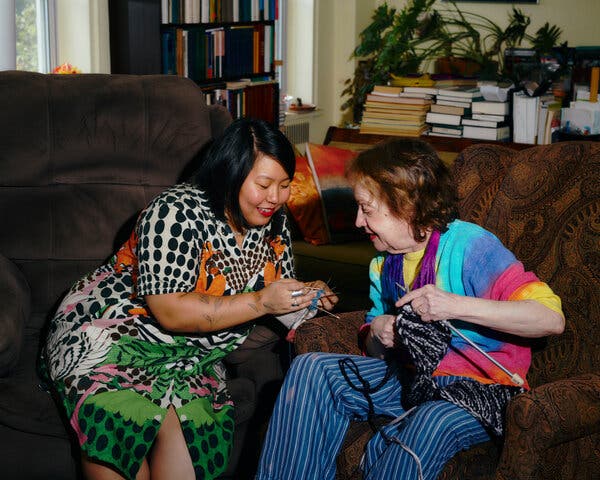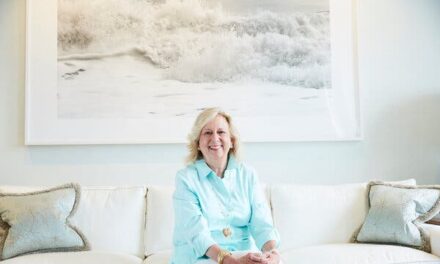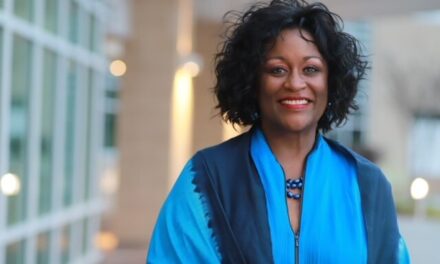After her son died by suicide nine years ago, Roslyn Scharf, a lifelong fitness devotee, went on the hunt for a trainer who could not only help her build physical strength, but who understood the emotional release she needed from her workouts at the time.
She found that in Omid Malekan, who was 40 years her junior and a relative stranger. But he had lost a friend to suicide years before and was not afraid to hold Ms. Scharf as she wept through reps.
“He dried my tears,” said Ms. Scharf, 83. “And he made sure I did my squats.”
Three days a week, every week, they worked out. “When Roz makes a commitment, she shows up!” said Mr. Malekan, 42. The more time they spent together, the more they realized they had in common.
“Here I am, a grandma, and here he is, a young man still single and trying to find himself, but we fell in love with so many of the same things,” Ms. Scharf said.
Both are devoted Mets fans who text or call each other over wins and losses, and both are avid readers. Ms. Scharf, who lives in Long Island, N.Y., invited Mr. Malekan, who goes back and forth between Queens and Long Island, to join her book club, which has met monthly for more than 20 years. He is the only middle-aged man among “a dozen octogenarian women who love him,” she said.
This kind of exchange of perspectives and life experiences is a hallmark of cross-generational friendship, which experts said can be an antidote to social isolation, an issue particularly pervasive among older Americans, and ageism. It may also help to boost life satisfaction and learning. A 2021 report from Generations United, a nonprofit that promotes policies that connect generations, cited data suggesting that older adults in intergenerational programs may experience a reduction of falls and frailty and an increase in strength and balance.
Intergenerational friendship “enriches us and gives us a sense of connection that is life-affirming and energizing,” said Marc Schulz, a professor of psychology at Bryn Mawr College and co-author of the book “The Good Life,” who has studied how important personal relationships are to happiness. In general, younger friends rely on their older friends for guidance, though the reverse is true, too. Dr. Schulz noted that the college students he has taught for three decades keep him “young” and “invigorated.”
There are challenges, however, to striking up cross-generational friendships. For one, older people tend to prioritize their existing relationships over seeking out new connections, Dr. Schulz said. A 2021 survey from the Survey Center on American Life found that nearly one-third of seniors said it had been at least five years since they made a new friend.
Our society is “really good” at segregating groups by age, said Shannon Jarrott, a professor of social work at Ohio State University who studies intergenerational community building. There tend to be a few exceptions where these kinds of bonds happen more organically, she said, including mentoring and volunteer opportunities, religious settings and, especially, workplaces. But Dr. Jarrott lamented that there are not more opportunities for people to strike up these friendships, because it means many of us are missing out on a chance to learn and grow.
In a 2019 AARP survey, more than 90 percent of respondents who had an older or younger friend said the relationship gave them things their other friendships could not deliver — namely, a new perspective, inspiration and a greater appreciation of their experiences.
When Neighbors Become ‘Framily’
Aarti Veernala, 38, believes the age difference between herself, her husband, Rahul, 43, and the couple’s neighborhood friends Joe Hunter, 76, and his wife, Judy, 81, helped them connect on a deeper level right from the start.
The foursome met in 2017 when the Hunters were on an evening stroll through their neighborhood in Aurora, Ill., while the Veernalas were on their porch. The older couple stopped to tell Mr. Veernala that he’d dropped a piece of mail, which led to some friendly small talk. Ms. Hunter asked whether the couple had children, and Mr. Veernala surprised them all by letting it slip that his wife was about five weeks pregnant — the first time the Veernalas had told anyone other than their parents.
Since that fateful overshare, the families have made an effort to really get to know each other, Ms. Veernala said. “That’s something you usually don’t see in people your own age, because we’re all in a hurry,” she added. “There’s always a little bit of haste in our actions. But Joe and Judy take the time to understand us.”
Ms. Hunter and Ms. Veernala like to teach each other American and Indian recipes; they baked nearly a hundred Christmas cookies together, which Ms. Veernala brought to her cousin’s wedding. And Mr. Hunter has helped Mr. Veernala with projects around the house (“I’m his favorite apprentice,” Mr. Veernala said). In February, the Hunters, who are frequent travelers, went to India largely because they wanted to understand more about their friends’ culture. (The Veernalas each moved to the United States about 15 years ago.)

“We wanted to see where they lived, where they went to school and meet their parents,” Mr. Hunter said. His wife rang in her 81st birthday at the Taj Mahal, accompanied there by Ms. Veernala’s mother and father.
Now, the two couples are closer than friends, joking that they’re “framily,” Mr. Veernala said. The Veernalas’ two children call the Hunters, who have four sons of their own, “grandma” and “grandpa” and have had sleepovers at their house.
Learning to Live With Curiosity and Generosity
The desire to stay active and socially engaged has led to a special friendship that Judy O’Meara, 80, and Bowen Kim, 29, didn’t see coming. When Ms. O’Meara reached out to her neighborhood community Listserv to organize a crafting group about a year ago, Mx. Kim, who is nonbinary and uses she/they pronouns, was the only person who responded. She had learned to knit during the pandemic and thought the crafting group sounded like fun.
A few months later, the pair sat on two folding chairs on the lawn of their apartment complex in the Bronx, realizing they’d lived one floor apart for six years but never interacted. (Ms. O’Meara was born in the development in the 1940s and moved back in 1998.) They knitted for about an hour — and have done so nearly every Friday afternoon since.
“All of my friends are grandparents, and I’m not. I have no children or grandchildren, and I was looking for companionship — and fun,” Ms. O’Meara said. She was, she said, “enchanted” by her young neighbor right away.
The friends usually bring a project to work on — “scarves, hats, things with big needles and big thick yarn,” said Ms. O’Meara, while Mx. Kim said she likes to knit things “with tiny yarn and small needles.” But more often than not, they end up just talking, Mx. Kim said, often about their very different experiences in the workplace. Ms. O’Meara was an administrative assistant in various small businesses, and she dealt with a level of harassment her younger friend — who works as a data analyst and also runs a small business selling L.G.B.T.Q.-focused enamel pins — cannot fathom.
But they don’t dwell on their differences, including their 50-year age gap. “The age is just kind of one dimension of it that adds color and flavor to it, but we would be friends regardless,” Mx. Kim said, expressing a sentiment shared by each of the friends interviewed for this story. Sure, there is an unexpected joy in connecting with someone much older or younger who can open you up to new experiences, but it is not the focus of their bond.
Ms. O’Meara, dressed in brightly colored clothing and tie-dyes, encourages her friend to be bolder with her knitting, giving her colorful yarn. And after Mx. Kim mentioned that her New Year’s resolution was to learn to cook a few Korean dishes, Ms. O’Meara showed up with a beginner’s cookbook in hand — all gestures that have shown Mx. Kim what it means to move through life with a sense of curiosity and generosity.
“This has really been my only experience getting to know somebody who was so much older than me,” Mx. Kim said. “Seeing her live in such an authentic, fun way, I think I have just been inspired to think more about how I want to live and be.”



